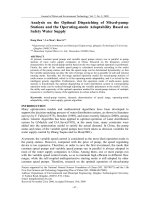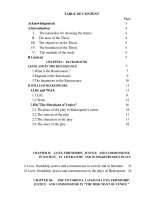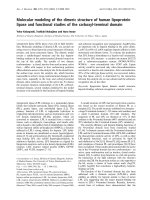810 the texts about the patron saints of england wales scotland and ireland
Bạn đang xem bản rút gọn của tài liệu. Xem và tải ngay bản đầy đủ của tài liệu tại đây (176.77 KB, 3 trang )
Read about the patron saints of England, Wales, Scotland and Ireland. Sum up
the information in the table.
ST. PATRICK
St. Patrick is the patron saint of Ireland. It is believed that he
was enslaved by Irish pirates who raided his home,
probably in South Wales. He managed to escape from
the pirates and began to be trained as a priest for
priesthood, but he never completed his training. Still he
was determined to return to Ireland and to evangelize its
people. He is said to have landed again in Ireland in the
5th
century and his work was a vital factor in the spread of
Christian influence there. His symbols are snakes and shamrocks. His feast-day
is on the 17th of March. This church festival is regarded as a national day in
Ireland. Shamrock was used by St. Patrick to illustrate the doctrine of Trinity. It
is adopted as the national emblem of Ireland.
ST. GEORGE
St. George is the patron saint of England. He was martyred
at Lydda in Palestine: he was shod in red-hot shoes, broken on a
spiked wheel and immersed in quicklime. The legend of his
having slain a dragon was very popular: he rescued a king's
daughter from becoming the dragon's tribute and so managed
to covert her people. Richard I (the Lionheart) was said to have
had a vision of him and was able to restore the saint's tomb at
Lydda. Saint George was proclaimed chief patron of England when English
soldiers under Henry V won the battle of Agincourt. His feast-day is on the 23d
of April. On this day some patriotic Englishmen wear a rose pinned to their
jackets.
ST. ANDREW
St. Andrew is the patron saint of Scotland. He was a New
Testament apostle who was martyred on an X-shaped cross
(St. Andrew's Cross). He was said to have given the Pictish
army a vision of this cross at the battle of Athenstoneford
between King Angus of the Picts and King Athelstan of the
Angles. St. Andrew was foisted upon Scotland as its patron
when the old Celtic and Culdee centres were superseded by the new bishopric
of St. Andrew's. His feast-day is on the 30th of November. On this day some
Scotsmen wear a thistle in the buttonhole.
ST. DAVID
St. David is the patron saint of Wales. According to the legend he was the son of a Prince
of Cardiganshire and uncle of King Arthur. He
was a Christian abbot and bishop and founded
twelve monasteries from Croyland to Pembrokeshire. In these monasteries the regime was very
austere. He was nicknamed 'Aquaticus' after his habit of drinking only water.
His feast-day is on the 1st of March. This day is regarded as the national holiday
of Wales (although it is not an official bank holiday). On this day many
Welshmen wear either a daffodil or a leek pinned to their jackets. These plants
are traditionally regarded as national emblems of Wales.
Country
England
Ireland
(Eire)
Scotland
Wales
Patron
Religious story
Feast-Day
Tradition
saint
St.
He was martyred at Lydda in 23 April
On this day some
George
Palestine by being shod in redpatriotic
Englishmen
hot shoes, broken on a spiked
wear a rose pinned
to
wheel and immersed in
their jackets
quicklime. He was proclaimed
chief patron of England when
English soldiers won a victory
over French soldiers at
Agincourt (1415).
Read about the national flags of Scotland, Northern Ireland, the Republic of
Ireland and England. Draw their sketches and colour them.
St. Andrew's cross is the national flag of
Scotland. It consists of two diagonal white stripes
crossing on a blue background. The flag forms part
of the British national flag (Union Jack).
St. Patrick's cross is the national flag of Northern
Ireland. It consists of two diagonal red stripes
crossing on a white background. It is part of the
Union Jack.
The national flag of the Republic of Ireland
consists of three vertical stripes of green, white and
orange. St. Patrick's cross was the national flag of
Ireland before the establishment of the Irish
Republic.
St. George's cross is the national flag of
England. It consists of a red cross on a white
background. The flag is part of the Union Jack.
Unite the parts of the flags and draw the national flag of Great Britain,
the Union Jack.









